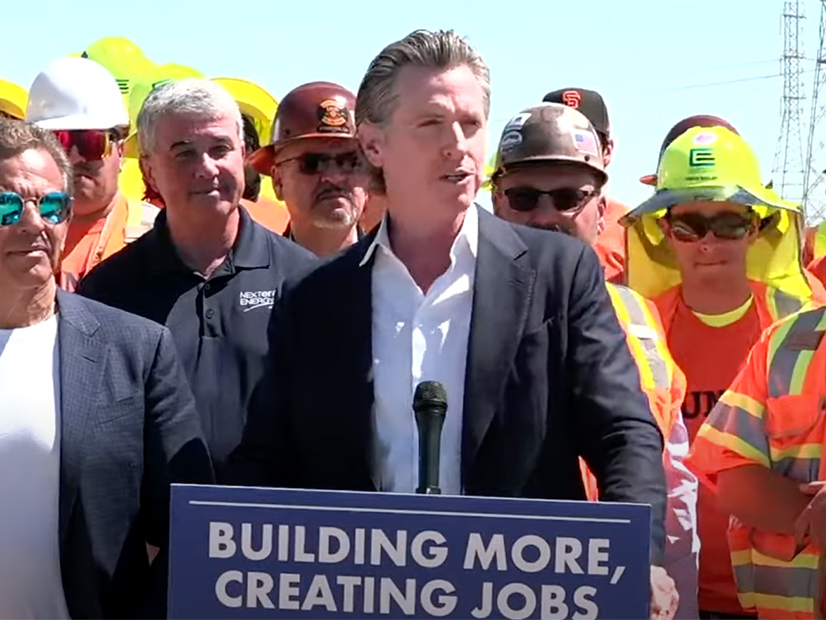
California Gov. Gavin Newsom and the state’s Public Utilities Commission announced separate efforts Thursday and Friday
to expedite approval and construction of clean energy projects and transmission lines.
The CPUC on Thursday approved a new proceeding to update its General Order 131-D, which governs the planning and construction of transmission facilities. The CPUC adopted the order in 1970 and last updated it in 1995.
“Updated rules that provide efficient pathways for review of upgrades and modifications to existing transmission infrastructure will help carry California forward to a clean energy future,” CPUC President Alice Reynolds said in a statement following Thursday’s vote to approve an administrative law judge’s proposed decision.
Last year’s Senate Bill 529 instructed the CPUC to change its rules by Jan. 1, 2024, to speed up transmission approval. The rules currently require a utility to seek a certificate of public convenience and necessity to construct “major electric transmission line facilities [that] are designed for immediate or eventual operation at 200 kV or more.”
The commission was required to update 131-D to authorize utilities to use the less burdensome “permit-to-construct” (PTC) process to build an “extension, expansion, upgrade or other modification to its existing electrical transmission facilities, including electric transmission lines and substations within existing transmission easements, rights of way or franchise agreements, irrespective of whether the electrical transmission facility is above a 200-kV voltage level.”
The new rulemaking will implement those changes and “consider additional modifications to modernize the rules governing the CPUC’s review of transmission and generation projects,” the commission said in a news release.
Law firm Nossaman, headquartered in Los Angeles, said in a post on its website that “while both processes require environmental review under the California Environmental Quality Act (CEQA), the PTC process generally does not require a detailed analysis of the need for or economics of a project that is required under the CPCN process. SB 529’s proponents believe that this could reduce the approval time for such projects under the PTC process to approximately one year in contrast to the multiyear CPCN process.”
California may need the expedited process to build enough transmission to meet its 100% clean energy mandate by 2045. CAISO last week approved its 2022/23 transmission plan, which identified 45 projects totaling $7.3 billion to be built in the next decade to meet the mandate while maintaining grid reliability. Next year’s transmission plan is expected to be equally large.
The CPUC rulemaking will also consider additional modifications to 131-D that would create a process for permitting battery storage projects; provide the commission with better cost information for electrical infrastructure projects; and increase cost transparency for all projects subject to 131-D, it said.
‘Unleash Construction’
On Friday, Newsom’s office said in a statement that he intends to propose a legislative package to “streamline projects to unleash construction across the state — accelerating the building of clean infrastructure so California can reach its world-leading climate goals while creating hundreds of thousands of jobs.”
The bill language was not immediately available, and details were sparse. Newsom said in the statement and a media event broadcast on YouTube that the proposals would speed up project permitting and limit challenges under the CEQA to nine months.
“The measures will facilitate and streamline project approval and completion to maximize California’s share of federal infrastructure dollars and expedite the implementation of projects that meet the state’s ambitious economic, climate and social goals,” the statement said.
The state plans to invest $180 billion in “clean infrastructure” projects over the next decade using funding from the past two state budgets and the federal Investment and Jobs and Inflation Reduction acts, Newsom’s office said. Projects that could be streamlined include solar, wind and battery storage projects, it said.
Newsom’s announcement followed the release Thursday of a report from nonprofit California Forward and former Los Angeles Mayor — and Newsom infrastructure adviser — Antonio Villaraigosa that urged permitting reform.
Newsom also signed an executive order Friday to create an “infrastructure strike team … to work across state agencies to maximize federal and state funding opportunities for California innovation and infrastructure projects,” including by identifying “projects on which to focus streamlining efforts, particularly those presenting significant challenges but also significant opportunities.”
Some environmental organizations took issue with limiting judicial review of CEQA cases to nine months, while industry groups such as Advanced Energy Economy applauded the governor’s announcement.


